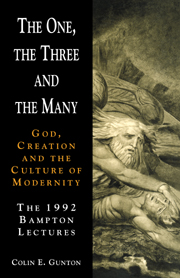Book contents
- Frontmatter
- Contents
- Preface
- Introduction
- PART ONE THE DISPLACEMENT OF GOD
- PART TWO RETHINKING CREATEDNESS
- 5 The universal and the particular. Towards a theology of meaning and truth
- 6 ‘Through whom and in whom …’ Towards a theology of relatedness
- 7 The Lord who is the Spirit. Towards a theology of the particular
- 8 The triune Lord. Towards a theology of the one and the many
- Bibliography
- Index
8 - The triune Lord. Towards a theology of the one and the many
Published online by Cambridge University Press: 05 June 2012
- Frontmatter
- Contents
- Preface
- Introduction
- PART ONE THE DISPLACEMENT OF GOD
- PART TWO RETHINKING CREATEDNESS
- 5 The universal and the particular. Towards a theology of meaning and truth
- 6 ‘Through whom and in whom …’ Towards a theology of relatedness
- 7 The Lord who is the Spirit. Towards a theology of the particular
- 8 The triune Lord. Towards a theology of the one and the many
- Bibliography
- Index
Summary
RECAPITULATION
In the first four chapters, the theological determinants of salient aspects of modern culture were traced, and it was argued that certain crucial values have been lost, or submerged, in leading currents of thought and action. The result is a defective conception and practice of what I have called relationality, so that central dimensions of our created being are ignored, suppressed or distorted. In particular, the personal values on which so much depends have been endangered by an inadequate grasp of the way in which human life belongs in, and is shaped by, its habitation in wider reality. I argued also that a double movement underlies the problematic. On the one hand, it is possible to understand the ills of modernity as arising from a displacement of God and the replacing of the creator by the creature, with the only superficially paradoxical result that a movement aiming to give central importance to life in time and space has as a matter of fact cramped and distorted that which it claims to preserve. On the other hand, the leading thinkers of the modern world had some cause for the direction they took. The development of theology in the West had been strongly monistic, stressing the oneness and arbitrary will of God in such a way that the reality and importance of the created world appeared to be called in question. Modernity's protest against bad theology is therefore in large measure justified, although its displacement of the divine has been catastrophic in its effects.
- Type
- Chapter
- Information
- The One, the Three and the Many , pp. 210 - 231Publisher: Cambridge University PressPrint publication year: 1993



